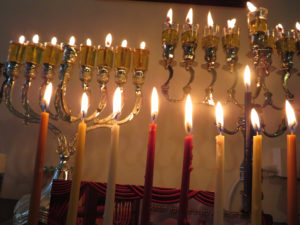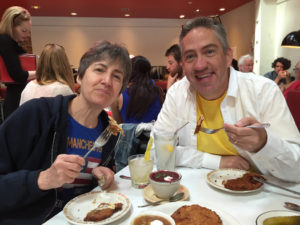The eight days of Hanukkah begin tonight, with this evening’s setting sun. Every time I write about Hanukkah, I feel a bit like I shouldn’t, for it’s always the same: I write about the latkes and the jelly doughnuts. What can I say? I like good food, and the things I can taste are the things I understand. I write, too, about light in dark times: eight nights of ever increasing light surely must be placed near the darkest time of the year for good purpose.
Be that as it may, I asked my good friend Judith Klau if she would be a guest blogger tonight for the Convivio Book of Days. To give us fresh perspective. But also because I love Judith and you would, too, if you knew her. She was a friend to Arthur Jaffe, whose collection of books evolved into the Jaffe Center for Book Arts, which I now direct. Judith volunteers there whenever she visits from Boston. Some of my favorite times at work are when I get to pair up with Judith to talk book arts with visitors. I’ve got the charm, somehow, but Judith’s got that plus the brains. We’ve shared this bookish connexion together for years. We’ve shared each other’s joys, and we’ve shared each other’s sorrows. When her partner Robert passed, Seth and I went to sit shiva with her. And last December, when we lost our pal Mike, who lived a rather solitary life, she was one of the few to come honor him and to spend time with us. I don’t think the wake and our Catholic ways were quite what she expected, but seeing Judith walk in warmed my heart.
When I asked her if she’d write some personal memory for Hanukkah, Judith got to work immediately and sent this. She apologized for not sending a memory but rather a screed. I had to pull down the dictionary to look up screed, which is how it goes sometimes when I chat with Judith. Already I had learnt something new, and I hadn’t even read her screed yet. Folks like Judith help make us better versions of ourselves. Ladies and gentlemen: I give you the thoughts of Judith Klau (who has me wondering now about the choice of spelling I’ve been using for Hanukkah all these years). –– John
CHANUKAH
by Judith Klau
Chanukah. Ok, let’s start with the spelling. I like this one because it tries to replicate the Hebrew orthography, the “ch” at the beginning (that my Yiddish teacher says is like the “ch” in the Scottish “Loch,” which is like substituting one unknown algebraic equation for another unknown algebraic equation) and the unvoiced “h” at the end. Well, do with it what you will.
But that does lead me into the conundrum of Chanukah, which is that the best part of the story (and the worst part) is that the story probably isn’t true. Is Santa real? Was there a Christmas tree in Bethlehem? What’s your definition of “true”?
The story that I learned in Sunday school was that Bad Greeks desecrated the Holy Temple by bringing in pigs. (That was the unholiest thing anyone could think of for people deprived of bacon.) When a brave band of brothers [sic], led by the oldest, Judah Maccabee, vanquished said Greeks, they found that the eternal light had gone out with only one small cruet [sic] of oil for it remaining. Now the commandment for this light is one of the facets of this post-biblical holiday that is in fact found in the Hebrew Bible. So its importance at least is “true.”
The story continues that it was determined that the nearest source for holy oil was eight days away. The cruet, however, held enough oil for only one day. And the crux (a Christian word if ever there was one) of the story is that that tiny remnant of oil lasted for eight days, hence the Chanukah Miracle, hence the eight lights, the eight nights, the oil, etc.
I was in my 70’s before I heard anyone say different. Here’s a precis of one scholarly interpretation: during the historical period of hostilities between Greeks and Jews, there was no access to the Temple; the people therefore couldn’t observe one of the Biblical holidays, Sukkot, a harvest festival that lasts eight days. It may later have become conflated with Chanukah, and the new holiday took on the numerology of the old. The whole Chanukah megillah, a term from yet another holiday, is beautifully explained here, at Haaretz.com. Even though, by my lights, they use that funny spelling with all the k’s. There’s probably a website about that and another one about why Sukkot is eight days.
So here’s your choice: Chanukah without the story, or Christmas without the tree. Be a kid, which is when the eternal light of our best delight learns to shine, and make your own memories.
Sad but realistic P.S.: Embedded in this history is another eternal light: that Jews are always in danger of being absorbed into the majority culture. That to me is the essence of the historical Chanukah story, the scary part. So seeing Chanukah lights, hearing that Sunday school story repeated, even tacky Chanukah displays and simple-minded songs (etching themselves into my brain as if they had a red-light at the end of their nose) help to dissipate that particular scariness at this darkest time of the year.
Image courtesy of Judith Klau, who writes: “Here are my children eating the traditional food of the holiday, potato latkes (pancakes). They are purists and choose sour cream as a topping. Some people choose apple sauce, and this year I am SHOCKED to hear that people are putting ketchup on latkes. In Yiddish we call that a ‘shandeh,’ a disgrace!”
Opening image: Chanukah Candles photographed by Breslevmeir, 2020 [Public domain] via Wikimedia Commons.
In lieu of a brief bio of Judith Klau, here’s a brief video. It’s an excerpt from an oral history project about her time at the Groton School in Groton, Massachusetts, where Judith was the English Department Head. It’s got a little bit of all I love about Judith.

